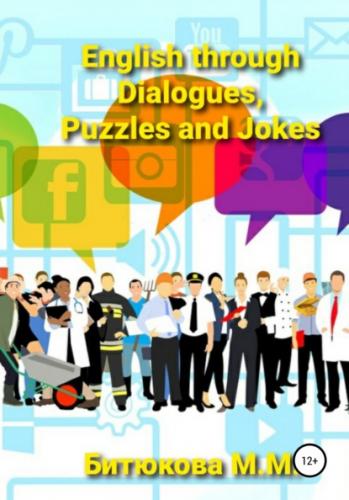a) Yes
b) No
3. Which is the most important meal of the day?
a) Breakfast
b) Dinner
c) Supper
4. According to experts, how much water should we drink each day?
a) 1 litre
b) 2 litres
c) 3 litres
5. Is snacking (eating between meals) good for health?
a) Yes, always.
b) No, never.
c) It depends upon what you eat.
6. According to doctors, how often should we eat fish?
a) Once a week
b) Twice a week
c) Every day
7. Are only fresh (uncooked) vegetables good for health?
a) Yes
b) No
8. Is it bad to have bread and pasta for dinner?
a) Yes
b) No
9. What is the key factor in a healthy diet?
a) Variety
b) Moderation
c) Balance
d) All of the above
10. If you are trying to lose weight, what should you do?
a) Eliminate all fat from your diet
b) Reduce the calories you consume and exercise regularly
c) Skip meals
d) All of the above
Answers to the test – at the end of the Unit.
Vocabulary
On the right track – на правильном пути
To damage – причинять вред
To snack – перекусить (например, между обедом и ужином)
Healthy diet – здоровое питание
Key – ключевой, основной
Variety – разнообразие
Moderation – умеренность
To lose weight – худеть
Eliminate – исключать
To reduce – уменьшать, сокращать
To consume – потреблять
To skip – пропускать, не есть
Fizzy drink – газированный напиток
Dressing – приправа, соус
Canned – консервированный
Starchy – содержащий много крахмала
Discuss in small groups of 3-4 students. Then give your resolution to the whole class.
– Is food important for you? How much is it important? What role does it play in your life?
– How much time a day do you spend on eating?
– Are you good at cooking? Who taught you? What is your favourite dish? Can you cook it yourself? What is the receipt?
– If you had to stay without appropriate meal for a day, what snack would you take with you?
– If your friends were going to visit you, what dishes would you prepare? Would you cook them yourself or would you order them in the restaurant?
Part Two. Vegetarians
Two British men, John and Michael, are talking about vegetarians. Read their dialogue and answer the questions:
1. What does one of the speakers say in favour of vegetarianism?
2. What does the other speaker say against vegetarianism?
John: You know, I listened to the program on the radio the other day about these vegetarians – they definitely live longer than people who eat meat.
Michael: Live longer? Vegetarians? Oh, come on, don’t be stupid.
John: No, no, no, it is the healthy alternative to eating. It’s, you know, the best way to…
Michael: No, I know a load of veggies, and they eat in healthy food restaurants, they buy, and they’re sick all the time. They’re pasty, pale…
John: Well, OK, maybe it doesn’t make you look so good, but, you know, a lot of people say they’re vegetarians and they don’t really know about cooking; but if you eat a good healthy balanced diet of vegetarian food you will live longer.
Michael: Balanced diet? Of vegetarian food? A balanced diet includes meat, doesn’t it? I mean, we’re designed to eat meat. That’s part of…
John: There are alternatives to meat. You can have pulses, you can have soya. There are loads of things, and, you know, if you’re vegetarian, you’re helping to protect animals.
Michael: No, I mean. You know, basically a lot of these animals wouldn’t exist if they weren’t made for meat.
John: Yeah, well, look at, we have all these problems, we’ve got foot and mouth disease, you’ve got, the, erm, what’s that disease called?
Michael: Yeah, but that’s, like, diseases. I mean, you know, there are diseases in humans, but that doesn’t really stop humanity, does it? It’s just, you know, it’s just natural. These things happen.
John: Hey, what’s that I can smell in the kitchen. Smells nice.
Michael: Mmm… That’s right. It’s some bacon. Fancy a sarnie?
John: Oh, I’d love one. I love the smell of a good bacon sarnie.
Vocabulary
Come on – people say this when think someone’s comments are incorrect or stupid
A load of – a lot of
A veggie – a vegetarian – someone who doesn’t eat meat
Pasty – with a sick, unhealthy look on your face
Pale – with no colour on your face
A balanced diet – food that you eat that includes food from all the major food groups
A pulse – food such as lentils (small, round, brown seeds) and beans
Soya – food made from soya beans
Foot and mouth disease – an illness that animals catch such as cows, sheep, etc.
Fancy a …? – would you like a …?
A sarnie – a sandwich (informal)
Discuss in small groups of 3-4 students. Then give your resolution to the whole class.
– What is your attitude to meat? How much meat a day/a week do you need? Which meat do you prefer: pork, beef or mutton?
– Can you stay without meat? For how long?
– Do you know any veggies personally? How have they come to such way of life? How do they feel without meat? Does their way of life influence on their health? In what way?
– What could make you become a veggie? Why/Why not?
Part Three. The English Breakfast
Two British men, Frank and Daniel, are talking about the famous English breakfast. Read their dialogue and answer the questions:
1. What does the British breakfast consist of?
2. What arguments are there in favour of the English breakfast?
3. What arguments are
